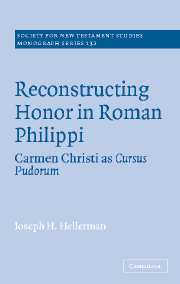Book contents
- Frontmatter
- Contents
- Acknowledgments
- List of abbreviations
- Introduction
- 1 Roman social organization
- 2 Preoccupation with honor and the cursus honorum
- 3 The Roman colony at Philippi
- 4 Honor and status in Philippi
- 5 Acts and Philippians
- 6 Carmen Christi as cursus pudorum
- 7 Summary and conclusion
- Notes
- References
- Index of ancient sources
- Index of modern authors
- Subject index
6 - Carmen Christi as cursus pudorum
Published online by Cambridge University Press: 22 September 2009
- Frontmatter
- Contents
- Acknowledgments
- List of abbreviations
- Introduction
- 1 Roman social organization
- 2 Preoccupation with honor and the cursus honorum
- 3 The Roman colony at Philippi
- 4 Honor and status in Philippi
- 5 Acts and Philippians
- 6 Carmen Christi as cursus pudorum
- 7 Summary and conclusion
- Notes
- References
- Index of ancient sources
- Index of modern authors
- Subject index
Summary
In humility regard others as better than yourselves.
Philippians 2:3Scholarly attention to Philippians 2:6–11 has generated an almost unmanageable bibliography. Much of this work has been preoccupied with issues of ontological Christology, as commentators have sought to clarify the meaning of expressions such as μορφῇ θεοῦ, ἁρπαγμόν, τὸ εἶναι ἴσα θεῷ, and ἑαυτὸν ἐκένωσεν, and the implications of these phrases for our understanding of the nature of the incarnation. My concerns here relate not to ontology but, rather, to the manner in which Paul's picture of the self-humiliation of Jesus would have resonated in the readers’ social context. I acknowledge that ontological questions can reasonably be asked of the text. Paul's purpose, however, is not to elucidate a static doctrine of the two natures of Christ but, rather, to engender behavior among his readers which he deems appropriate for those whose citizenship is in heaven. To accomplish this end, Paul offers his readers a Jesus who embarks on what can only be viewed from the perspective of the dominant culture as a cursus pudorum – “a succession (or race) of ignominies.” The imitation of Jesus, then, to which Paul calls his readers presupposes a wholesale inversion of the relational orientation of the dominant culture, particularly as we have seen it realized in the pronounced social verticality of the colony of Roman Philippi.
- Type
- Chapter
- Information
- Reconstructing Honor in Roman PhilippiCarmen Christi as Cursus Pudorum, pp. 129 - 156Publisher: Cambridge University PressPrint publication year: 2005



